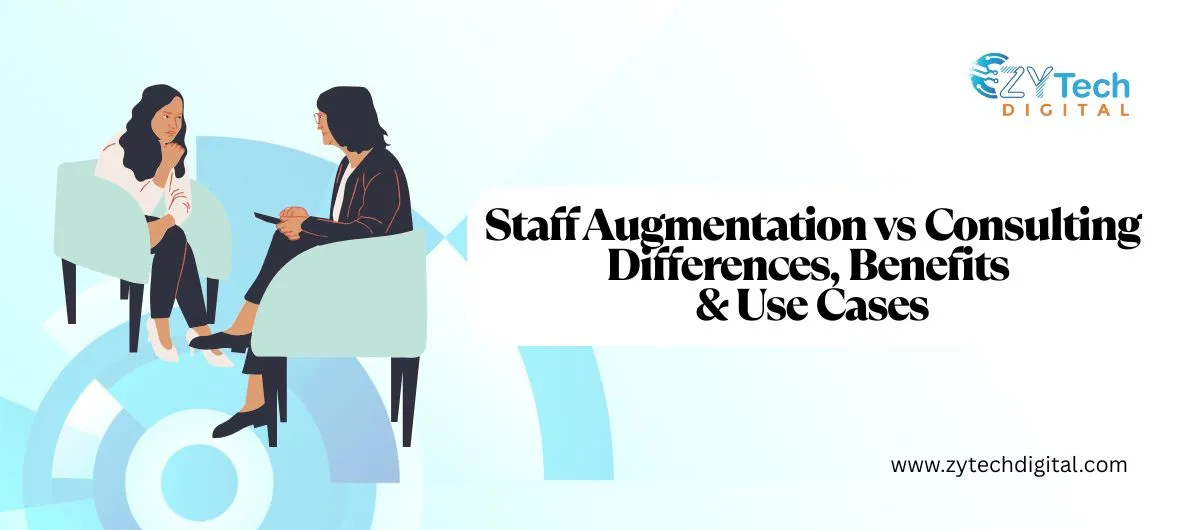
- April 11, 2025
- admin
- 0
Navigating the complex landscape of resource management, I’ve often grappled with the decision between staff augmentation and consulting services. Both avenues offer unique advantages, and understanding their nuances has been pivotal in optimizing project outcomes. In this comprehensive guide, I’ll share insights drawn from personal experiences to elucidate the distinctions, benefits, and considerations of staff augmentation vs consulting.
Introduction
In today’s fast-paced business environment, acquiring the right talent at the right time is a formidable challenge. The global tech staffing market underscores this reality, with projections estimating its value to reach a staggering $470 billion by 2023. This surge reflects the escalating demand for specialized expertise. However, merely allocating funds isn’t the panacea; devising a strategic approach to outsourcing is paramount. Surveys indicate that 60% of companies employ staff augmentation to bridge skill gaps, while 72% engage consulting services to address specific business challenges. Both models are instrumental in bolstering business operations, but discerning their core differences is essential for effective implementation.
Contact us now for a free consultation!
What and Why: Staff Augmentation vs. Consulting Services
Embarking on various projects, I’ve encountered scenarios where augmenting our team with external talent was imperative. This approach, known as staff augmentation, involves integrating skilled professionals into our existing workforce to meet project demands without the long-term commitments of traditional hiring. Conversely, there have been instances where seeking external expertise to provide strategic guidance was more appropriate—this is where consulting services come into play. Understanding the distinctions between these models has been crucial in making informed decisions.

What is Staff Augmentation?
Staff augmentation is a flexible outsourcing strategy that enables organizations to hire tech talent globally and manage augmented teams directly. Unlike traditional employment, this approach allows employers to add skilled professionals to their existing teams on an as-needed basis, addressing short-term or project-specific skill gaps without the long-term commitment of hiring new full-time employees.
Benefits of Staff Augmentation:
- Cost Efficiency: By leveraging staff augmentation, companies can significantly reduce overhead costs associated with recruitment, benefits, infrastructure, and long-term employment. You pay only for the specific skills and time required, eliminating unnecessary expenses.
- Scalability and Flexibility: Easily scale your team up or down based on project demands without the overhead costs associated with permanent hires.
- Access to Specialized Talent: When you need niche skills that are rare in the job market, staff augmentation connects you with the best talent available.
- Project Control: Maintain direct oversight and communication with temporary staff, enabling real-time progress tracking and issue resolution.
In my experience, staff augmentation has been invaluable during periods of increased workload, allowing us to swiftly onboard professionals with the exact skill sets required, thereby maintaining project momentum and meeting tight deadlines.
When to Choose Staff Augmentation: Use Cases from My Experience
Here are the situations where staff augmentation saved me time and money:
- Scaling fast for tight deadlines: We added developers during a product launch.
- Bridging a skills gap: We needed someone with React Native experience—fast.
- Temporary support: I brought in QA engineers to test during peak release cycles.
- Avoiding long-term hiring commitments: Perfect during uncertain economic times.
What is Consulting?
Consulting refers to the practice of providing expert advice to organizations seeking to improve performance, solve complex problems, or achieve specific goals. Consultants are professionals or organizations that bring specialized knowledge and skills to the table, offering insights and solutions that may not be available within the client organization.

Benefits of Consulting Services:
- Strategic Guidance: Consultants offer perspective and strategic insights to help you navigate complex business challenges.
- Process Optimization: Consultants can assess your existing processes and identify opportunities for improvement.
- Objective Analysis: With an external viewpoint, consultants provide unbiased assessments, facilitating informed decision-making.
- Specialized Expertise: Consultants bring focused expertise when seeking specialized knowledge in industries like legal compliance, market research, or digital transformation.
For instance, during a major organizational restructuring, engaging a consulting firm provided us with strategic insights that were instrumental in navigating the transition smoothly and effectively.
When to Choose Consulting: Use Cases from My Experience
On the flip side, here’s when I turned to consulting firms:
- Strategic planning: Helped define our cloud migration roadmap.
- Complex problem-solving: We needed help refactoring legacy code.
- Industry expertise: Entering a regulated industry requires compliance experts.
- Change management: Consultants helped restructure our development workflow.
What Is Staff Augmentation and Consulting—and Why Should You Compare Them?
Staff Augmentation (My Go-To for Rapid Team Scaling)
In simple terms, staff augmentation is when you temporarily hire external professionals to support your existing team. These professionals might be developers, designers, testers—you name it. They’re not freelancers; they become an extended part of your in-house team.
I love this model when I need extra hands fast, without the time-consuming process of hiring full-time employees. Plus, it’s more cost-effective than building an in-house team from scratch.
Consulting (The Shortcut to Expert Advice)
Consulting services, on the other hand, are all about bringing in specialized expertise. A consultant or consulting firm analyzes your situation, offers recommendations, and may even execute a solution for you.
I usually bring in consultants when I’m dealing with strategic issues, like rethinking our tech stack or entering a new market. Consultants don’t just join your team—they advise, lead, and sometimes deliver.
Key Differences: Staff Augmentation vs. Consulting
Understanding the distinctions between staff augmentation and consulting is crucial for selecting the appropriate model for your needs.
- Scope of Service:
- Staff Augmentation: Focuses on extending internal team capabilities by adding specific skills and tasks.
- Consulting: Provides comprehensive strategic solutions, often encompassing broader organizational challenges.
- Control and Management:
- Staff Augmentation: You retain complete control over the augmented staff, managing their day-to-day activities and integrating them into your team.
- Consulting: Consultants operate more autonomously, providing recommendations and leading implementations with less direct oversight.
- Flexibility:
- Staff Augmentation: This offers high flexibility, allowing you to scale your workforce up or down based on project needs.
- Consulting: While flexible in delivering expertise, consulting engagements are typically project-based with defined scopes and timelines.
- Security:
- Staff Augmentation: Requires integrating external staff into your internal systems, necessitating robust security measures to protect sensitive information.
- Consulting: Consultants may access confidential data, so clear agreements and protocols are essential to maintain data security.
- Staff Augmentation: Requires integrating external staff into your internal systems, necessitating robust security measures to protect sensitive information.
- Costs:
- Staff Augmentation: Generally more cost-effective for short-term needs,
Final Thoughts: Staff Augmentation vs Consulting
Choosing between staff augmentation and consulting ultimately comes down to your specific business goals, timelines, and resource needs. If you need to quickly scale your team with specialized skills while maintaining full control, staff augmentation is likely the way to go. However, if you’re facing strategic challenges that require expert insights or long-term transformation, consulting services offer the structure and experience to guide you through it.
In my journey, I’ve learned that there’s no one-size-fits-all solution. Sometimes, a blend of both models provides the perfect balance—augmenting staff to execute while consulting experts to shape the strategy. The key is understanding your pain points, project scope, and desired level of involvement.
By evaluating your needs honestly, you can choose the model—or combination—that delivers the best value and results for your organization.
READ MORE: Software Development Staff Augmentation
Frequently Asked Questions (FAQs) related to Staff Augmentation vs Consulting
Staff augmentation involves hiring external professionals to support your existing team temporarily, giving you control over their day-to-day tasks. In contrast, consulting provides strategic guidance and expert advice from an external party who often leads the solution implementation with less direct oversight.
Use staff augmentation when you need to quickly scale your team, fill temporary skill gaps, or increase capacity for a specific project without long-term hiring. It’s ideal for short-term needs, product launches, or tech development sprints.
Consulting is more suitable when you need strategic insight, problem-solving, or expert advice on business transformations, compliance, or entering new markets. Consultants help you plan, optimize, and sometimes even execute changes at the organizational level.
Yes, staff augmentation is typically more cost-effective than full-time hiring or consulting for short-term or specific skill needs. You avoid costs related to recruitment, benefits, training, and long-term commitments.
Not exactly. Staff augmentation is a form of outsourcing where you temporarily integrate professionals into your internal team. Traditional outsourcing, on the other hand, involves handing off an entire function or project to an external team or vendor.
In most cases, staff augmentation allows you to onboard professionals in days or weeks—much faster than traditional hiring processes. This speed is one of its key advantages, especially during critical project phases.
Speak With Expert
Fill The Form Below

